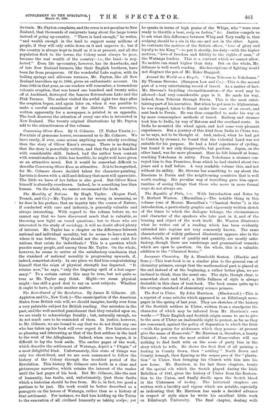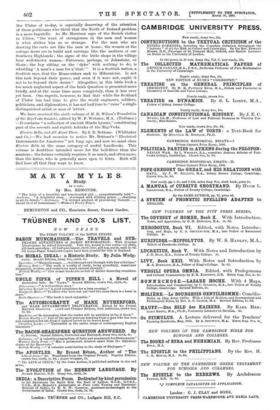The Scot in Ulster. By John Harrison. (Blackwood.)—This is a
reprint of some articles which appeared in an Edinburgh news- paper in the spring of last year. They are sketches of the history of the Scottish settlers in Ulster, written from a standpoint the character of which may be inferred from Mr. Harrison's own words :—" Their English and Scottish origin seems to me to give to the men of Ulster an inalienable right to protest, as far as they are concerned, against the policy of Separation to which the Irish —with the genius for nicknames which they possess—at present give the name of Home-rule." Mr. Harrison is, therefore, a hearty Unionist ; but even the most ardent of Home-rulers will see nothing to find fault with on the score of party bias in the story which he tells. He shows the Scot first of all gaining a footing in County Down, then " settling " North Down and County Armagh, then figuring as the magna pars of the "planta- tion " in Ulster, then bringing his Church with him into his new home. Mr. Harrison, in his last three chapters, treats of the special role which the Scotch played during the Irish Rebellion of 1641, gives the history of Ulster from the Restora- tion to the Union, and finally dwells upon the Scotch blood in the Ulstermen of to-day. The historical chapters are written with a lucidity and vigour which are notable, especially as indicating that Mr. Harrison has made a decided advance in respect of style since he wrote his excellent little work on Edinburgh University. The final chapter, dealing with the Ulster of to-day, is especially deserving of the attention of those politicians who think that the North of Ireland problem is a mere bagatelle. As Mr. Harrison says of the Scotch visitor to Ulster, "the want of strangeness in the men and women is what strikes him as so strange. For the men who are drawing the carts are like the men at home ; the women at the cottage doors are in build and carriage like the mothers of our Southern Highlands ; the signs of the little shops in the village bear well-known names,-Patterson, perhaps, or Johnstone, or Sloan ; the boy sitting on the dyke' with nothing to do, is whistling A man's a man for a' that " It is a Scottish nation, a Scottish race, that the Home-rulers seek to Hibernicise. Is not this task beyond their power, and even if it were not, ought it not to be beyond their desire ? Altogether, in this little book a too much neglected aspect of the Irish Question is presented more briefly, and at the same time more completely, than it has ever yet been. One regrets, however, to find that while the Scotland of Ulster has had time to give the world engineers, soldiers, politicians, and diplomatists, it has not had time to "raise" a single distinguished artist or man of letters.



















































 Previous page
Previous page